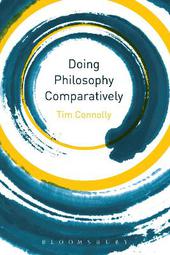
|
Doing Philosophy Comparatively
Paperback / softback
Main Details
| Title |
Doing Philosophy Comparatively
|
| Authors and Contributors |
By (author) Tim Connolly
|
| Physical Properties |
| Format:Paperback / softback | | Pages:208 | | Dimensions(mm): Height 234,Width 156 |
|
| Category/Genre | Philosophy |
|---|
| ISBN/Barcode |
9781780938394
|
| Classifications | Dewey:109 |
|---|
| Audience | | Undergraduate | | Postgraduate, Research & Scholarly | |
|---|
|
Publishing Details |
| Publisher |
Bloomsbury Publishing PLC
|
| Imprint |
Bloomsbury Academic
|
| Publication Date |
18 June 2015 |
| Publication Country |
United Kingdom
|
Description
Critics have argued that comparative philosophy is inherently flawed or even impossible. What standards can we use to describe and evaluate different cultures' philosophies? How do we avoid projecting our own ways of thinking onto others? Can we overcome the vast divergences in history, language, and ways of organizing reality that we find in China, India, Africa, and the West? Doing Philosophy Comparatively is the first comprehensive introduction to the foundations, problems, and methods of comparative philosophy. It is divided into three parts: - A wide-ranging examination of the basic concepts of comparative philosophy, including "philosophy", "comparison", "tradition", and "culture" - A discussion of the central problems that arise in extending philosophy across cultural boundaries: linguistic, justificatory, and evaluative incommensurability; projection and asymmetry; and the validity of cultural generalizations - A critical look at the dominant contemporary approaches to comparative philosophy. Presenting a basic tool-kit for doing philosophy at the cross-cultural level, this textbook draws on many examples from the past and present of comparative philosophy and engages readers in sustained reflection on how to think comparatively.
Author Biography
Tim Connolly is an Associate Professor of Philosophy at East Stroudsburg University, USA. He teaches and writes about Chinese philosophy and ancient Greek philosophy.
ReviewsThe author faces the topics [in this book] in a concise but thought-provoking manner ... outlines the discipline in an exciting way ... [A] vibrant introduction to comparative philosophy. * Journal of East-West Thought * This is a highly recommendable book not only for undergraduate courses but for the general public interested in the exchange of ideas between "cultures" and "philosophies." Connolly set out to perform an important and difficult task. He has succeeded. * Springer * [A]n up-to-date and very informative book ... an excellent starting point for anyone interested in the field of comparative philosophy. ... Tim Connolly has established a benchmark for the study of comparative philosophy ... by offering a clear summary of the key issues and by providing a platform for nurturing future philosophers to think beyond their localized perspectives. * OCCT Review * An excellent resource to help students through the tangled territories of comparative philosophy - this much needed text renders complex issues accessible to new-comers to the field without over-simplifying. It is clearly written, engaging in style, and balanced in its discussion and presentation of the debates about what comparative philosophy is, could, and should be. -- Sor-hoon Tan, Associate Professor in the Department of Philosophy, National University of Singapore Defending a truly comparative approach to philosophy is more complex than simply dealing with different languages and cultures: most introductions to philosophy include only Western philosophy, thus implying that the major philosophical traditions are to be found in the West. In this well-written, jargon-free textbook, Connolly (East Stroudsburg Univ.) sensitively addresses the worthiness and significance of comparative philosophy while also acknowledging the difficulties that arise from a comparative approach. The basic concepts the author develops can be readily applied to a variety of Western traditions as well as to philosophy in a more general sense. Each of the 11 chapters concludes with rich suggested readings and discussion questions that will serve well in classroom settings. This volume marks an extraordinary step forward in comparative philosophy, and this reviewer knows of no better guidebook. An invaluable resource for those pursuing a career in comparative philosophy. Summing Up: Highly recommended. Graduate students, researchers, faculty. -- D. P. Prianti, Gannon University * CHOICE *
|